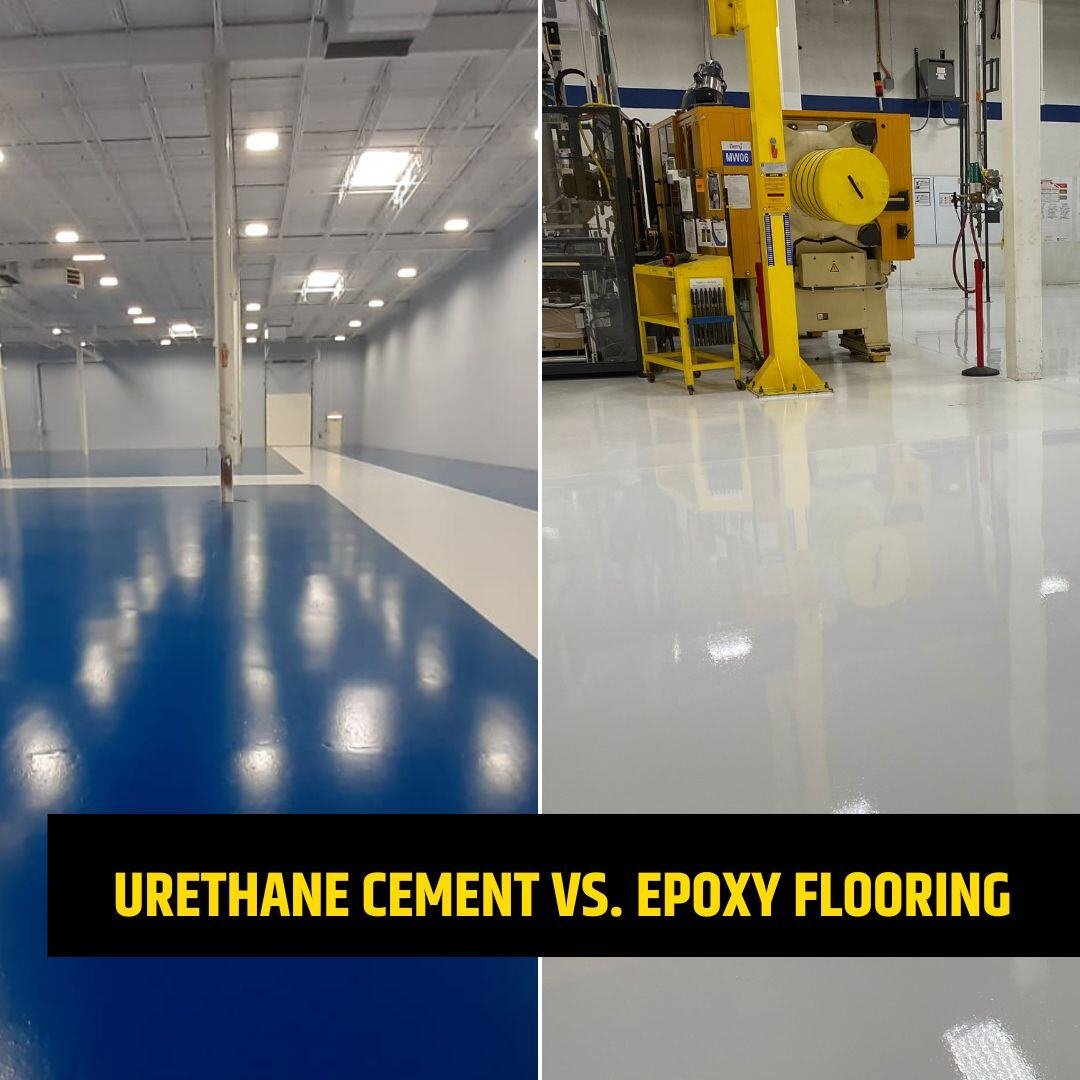
Selecting the right flooring for your industrial or commercial space can be a daunting task. With so many options available, the decision is more than just about aesthetics. Your flooring will impact the long-term performance of your facility, maintenance costs, and overall durability of the floor. Choosing the wrong material can lead to frequent repairs, higher operational costs, and potential disruptions to your workflow.
At CustomCrete, we get it. We’ve spent over 20 years helping businesses like yours with high-performance flooring systems that stand up to the toughest conditions. Whether you're managing a high-traffic warehouse, a chemical plant, or a food processing facility, we understand the specific needs of your environment and the all important desire to get the most bang for your buck.
In this article, we’ll break down the key differences between Urethane Cement and Epoxy Flooring. We’ll explore the strengths and weaknesses of each, helping you make an informed decision that fits your durability, cost, and maintenance needs.
What is Urethane Cement Flooring and Where is it the Best Option?
Urethane Cement is a heavy-duty flooring solution that combines the durability of cement with the flexibility and chemical resistance of urethane. It’s known for its exceptional strength and resilience in environments exposed to extreme conditions. Typically applied by a worker using a trowel, urethane cement is seamless and forms a thick, durable surface that can withstand heavy traffic, thermal shock (a phenomenon where a surface coating separates from the concrete floor to which it is applied), and harsh chemicals.
Urethane Cement is widely used in industries such as food processing, kitchens, breweries, chemical plants, and pharmaceutical facilities, where hygiene, moisture resistance, and durability are crucial.
What Are the Pros of Urethane Cement?
Superior Durability: Urethane Cement is ideal for spaces that require maximum impact resistance, heavy-duty wear, and high traffic. It can withstand moisture vapor transmission, extreme temperatures, thermal shock, and heavy machinery.
Chemical and Moisture Resistance: One of its standout features is its resistance to some chemicals, acids, and caustic substances. It’s also highly moisture-tolerant, making it an excellent choice for areas exposed to frequent spills or high humidity.
Hygienic and Easy to Clean: The seamless, non-porous surface makes urethane cement highly hygienic. It’s easy to clean and won’t harbor bacteria, which is essential for industries like food processing or healthcare.
Slip Resistance: Urethane cement provides excellent slip resistance, an important consideration in wet or hazardous environments.
Thermal Shock Resistance: Unlike many other flooring materials, urethane cement won’t crack or degrade under sudden temperature changes, making it ideal for kitchens, labs, and production areas where temperatures fluctuate.
What Are the Cons of Urethane Cement?
Higher Cost: Urethane Cement is one of the more expensive flooring solutions. While it offers superior durability and resistance, the upfront cost can be a barrier for some businesses, especially small to mid-sized companies.
Complex Installation: The installation of urethane cement is more involved than epoxy. It requires skilled professionals and a significant amount of labor to install properly, which adds to both the time and cost of the project.
Rigid Installation Process: Urethane cement must be applied in controlled conditions. It’s sensitive to moisture during application, meaning the substrate must be dry and prepared meticulously to ensure optimal adhesion.
 What is Epoxy Flooring and Where is it the Best Option?
What is Epoxy Flooring and Where is it the Best Option?
Epoxy flooring is a high-performance solution known for its strength, versatility, and wide range of applications. Made from a mix of two chemicals that harden when put together, epoxy forms a tough, durable, and smooth surface that is resistant to a variety of chemicals and mechanical stress.
Epoxy is a popular choice for industrial and commercial spaces where the floor will be subject to heavy wear but doesn’t need to handle extreme temperature shifts or moisture exposure.
Epoxy is commonly used in warehouses, garages, laboratories, office spaces, and auto shops. It’s particularly effective in areas that require a long-lasting, cleanable surface with moderate chemical exposure.
What Are the Pros of Epoxy Flooring?
Durability: Epoxy is highly durable and can withstand heavy foot traffic, machinery, and light impact. It’s a go-to solution for warehouses and manufacturing facilities that experience moderate wear and tear.
Chemical Resistance: Epoxy has solid resistance to chemicals, oils, and solvents. While it’s not as resistant as urethane cement to extremely harsh substances, it’s still an excellent choice for environments where exposure to mild to moderate chemicals is a concern.
Aesthetic Flexibility: Epoxy offers a wide range of colors, textures, and finishes, making it a versatile option for creating visually appealing floors. You can even add decorative chips or aggregates for an enhanced look.
Cost-Effective: Epoxy is a more affordable option compared to urethane cement, making it an attractive choice for businesses with tighter budgets. It provides great value for performance, particularly in environments where extreme resistance isn’t needed.
Easy Maintenance: Epoxy floors are easy to maintain. Their smooth, non-porous surface resists dirt and stains, making cleaning and upkeep a breeze.
 What Are the Cons of Epoxy Flooring?
What Are the Cons of Epoxy Flooring?
Moisture Sensitivity: Epoxy is more sensitive to moisture than urethane cement. Humidity and moisture vapor can compromise its adhesion and lead to issues such as blistering or delamination if not properly controlled.
Temperature Sensitivity: While durable, epoxy can be prone to cracking under extreme temperature fluctuations. It's less resistant to thermal shock than urethane cement, which makes it less ideal for environments where temperature changes are common.
Long Curing Time: Epoxy requires a longer curing time than other coatings, which can lead to longer downtime in your facility. Typically, it can take 24-48 hours to fully cure, depending on environmental conditions.
When Should You Choose Urethane Cement?
Urethane Cement is the top choice when extreme durability, moisture vapor resistance, and chemical resistance are your primary concerns. If your space requires a floor that can withstand heavy impacts, sudden temperature fluctuations, frequent spills, or exposure to chemicals, urethane cement is the solution.
Industries like food processing, breweries, pharmaceutical production, and chemical plants can benefit from urethane cement’s ability to withstand harsh conditions without compromising performance. If maintaining a hygienic, slip-resistant, and durable surface is your priority, urethane cement is the superior option.
 When Is Epoxy Flooring the Better Choice?
When Is Epoxy Flooring the Better Choice?
Epoxy flooring is a better choice for spaces where moderate wear and tear, chemical resistance, and aesthetics are key considerations, but extreme durability and moisture resistance are not as critical. If you need a cost-effective, long-lasting flooring solution for areas like warehouses, retail spaces, commercial kitchens, or garages, epoxy offers excellent performance at a more affordable price.
Epoxy is also a great option if you’re looking for a customizable floor with aesthetic flexibility. It’s ideal for environments where appearance matters, like office spaces, showrooms, and commercial buildings, while still providing protection against mild chemicals and moderate impacts.
Urethane Cement vs Epoxy Flooring: A Side-by-Side Comparison
Here’s a quick comparison to help you make the right choice:
|
Feature |
Urethane Cement |
Epoxy Flooring |
|
Durability |
Very high: Ideal for extreme conditions |
High: Ideal for moderate use |
|
Chemical Resistance |
Excellent |
Excellent |
|
Moisture VaporResistance |
High |
Moderate |
|
Temperature Resistance |
Excellent (thermal shock resistant) |
Moderate (can crack under extreme temperatures) |
|
Cost |
Higher |
More budget-friendly |
|
Installation Complexity |
Complex, requires skilled professionals |
Relatively straightforward, still best to be done by pros |
|
Maintenance |
Low (resistant to wear and moisture) |
Moderate |
 Making the Right Flooring Decision for Your Needs
Making the Right Flooring Decision for Your Needs
Choosing between Urethane Cement and Epoxy Flooring ultimately depends on the demands of your space. If you're dealing with extreme wear, moisture, temperature fluctuations, and heavy chemical exposure, Urethane Cement is your best bet. It’s the ultimate high-performance flooring solution for demanding environments.
If you're looking for a cost-effective, versatile flooring option for moderate-use areas, Epoxy Flooring is a strong choice. It delivers excellent durability, chemical resistance, and aesthetic flexibility at a more affordable price point.
Now that you know the difference between Urethane Cement and Epoxy Flooring, your next step is to look at pricing differences in order to find what best suits your budget. We can help guide you through the selection process to ensure you choose the best flooring solution for your specific needs.


